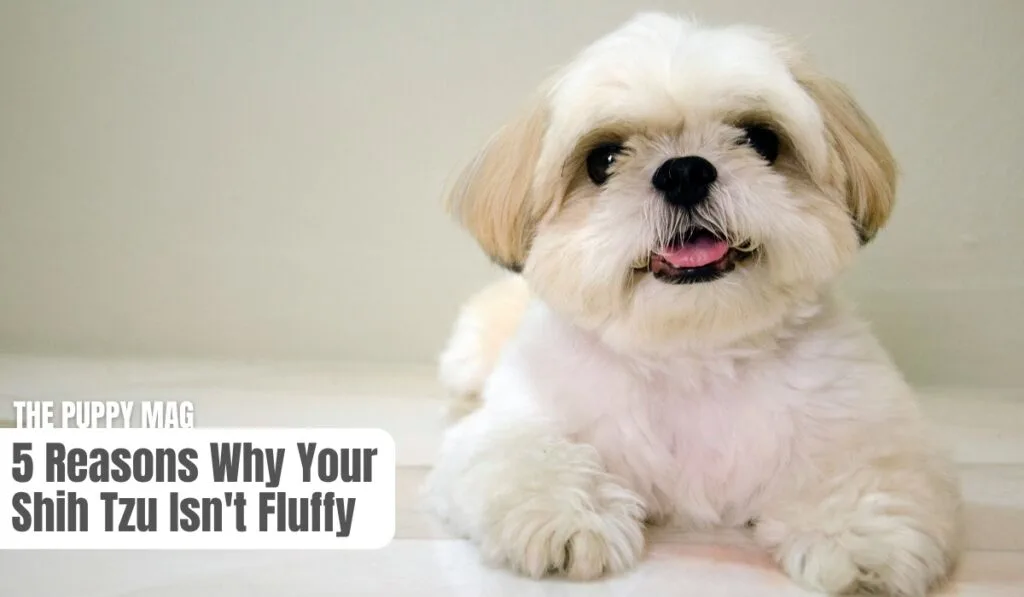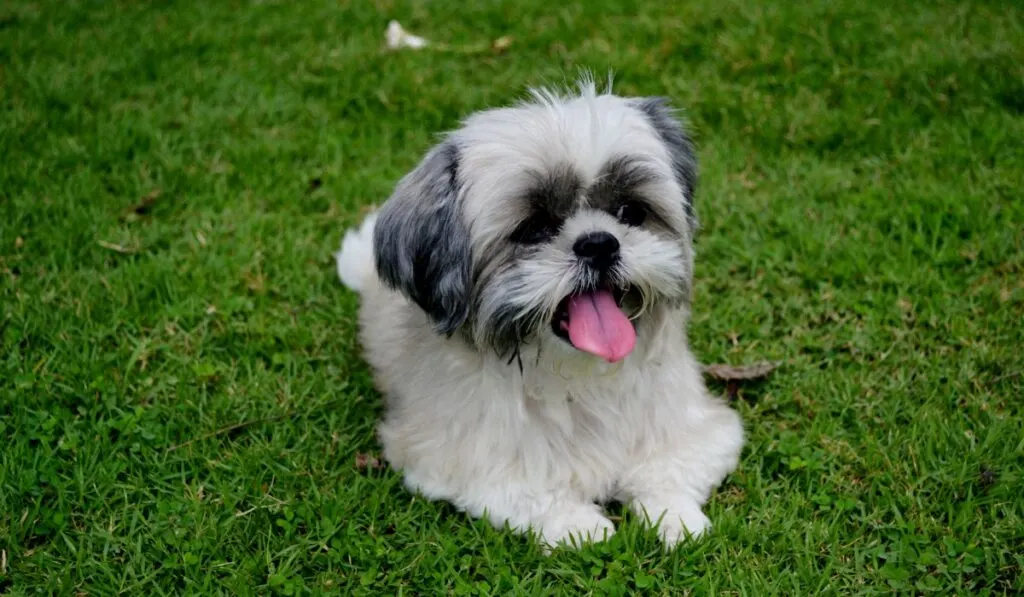I often get questions about the fluffiness of Shih Tzu hair.
It turns out it’s fairly common that owners don’t know why their Shih Tzu isn’t as fluffy as some others they may have seen online or at the dog park.
In this article, I will discuss some of the reasons why your Shih Tzu’s hair might not be as fluffy as you’d like, as well as provide tips on how you can enhance the fluffiness of their coat.
I’ll also share some general coat care advice for Shih Tzus to keep them looking and feeling their best. Let’s dive in!

Shih Tzu Coat Basics
Shih Tzus have a double coat consisting of two layers: a soft, dense undercoat and a longer, coarser outer coat.
This double layer provides insulation, protection from the elements, and contributes to the breed’s distinctive appearance.
Shih Tzus can have a variety of coat types, ranging from silky and flowing to thicker, more cotton-like textures.
Regardless of the specific coat type, Shih Tzus are known for their long, flowing hair that can grow to floor length if left untrimmed.
5 Reasons Your Shih Tzu Isn’t Fluffy
Let’s run through the main five reasons why a Shih Tzu might not be as fluffy as some others out there. Keep in mind, for your Shih Tzu, it could be just one or a combination of all the reasons below.
And make no mistake, as long as your Shih Tzu is in full health, it doesn’t really matter about the fluffiness of their coat, ultimately, some are just fluffier than others by genetics. More on that below.
1. Genetics
The first and most obvious reason why your Shih Tzu’s hair might not be as fluffy as you’d like is simply due to genetics.
Just as humans have different hair types, so do dogs. According to the American Kennel Club (AKC), Shih Tzus can have a range of coat types, from silky and flowing to thicker and more cotton-like. Some Shih Tzus naturally have fluffier hair, while others have a sleeker, more manageable coat.
It’s important to remember that a Shih Tzu’s coat is influenced by their genetic makeup, which is something we cannot change. However, proper grooming and care can help improve the appearance of your dog’s coat, even if it’s not naturally fluffy.
2. Poor Nutrition
A poor diet can contribute to a lackluster coat in Shih Tzus. As with humans, what your dog eats plays a significant role in their overall health, including the health of their skin and coat.
A diet lacking essential nutrients like omega-3 fatty acids, protein, and vitamins can result in dull, dry hair that’s more prone to matting and tangling.
To ensure your Shih Tzu is getting the nutrients they need for a healthy, fluffy coat, consider feeding them a high-quality, well-balanced dog food that meets their nutritional needs. The ASPCA recommends discussing your pet’s diet with a veterinarian to make sure it’s suitable for their age, size, and activity level.
3. Inadequate Grooming
Regular grooming is essential for maintaining a healthy, fluffy coat in Shih Tzus. Their long, double coat requires frequent brushing to remove loose hair, prevent tangles, and distribute natural oils. If your Shih Tzu’s coat isn’t as fluffy as you’d like, it could be due to a lack of proper grooming.
Brushing your Shih Tzu at least three times a week can help keep their hair fluffy and tangle-free. Using the right tools, such as a pin brush, slicker brush, or comb designed for long-haired breeds, is crucial for effective grooming.
Don’t forget to regularly trim their hair, especially around the eyes, ears, and paws, to keep them comfortable and looking their best.

4. Dry Skin and Coat
Dry skin and coat can make your Shih Tzu’s hair appear less fluffy and healthy. Dryness can be caused by a variety of factors, including environmental conditions, allergies, and bathing too frequently with harsh shampoos. If your dog’s skin is itchy, flaky, or irritated, it’s essential to address the underlying issue to improve their coat’s appearance and texture.
Moisturizing shampoos and conditioners specifically formulated for dogs can help maintain the natural oils in your Shih Tzu’s coat, preventing dryness and enhancing fluffiness. Also, consider using a leave-in conditioner or detangler spray after bathing to keep their hair soft and manageable. If you suspect your Shih Tzu has an allergy or skin condition, consult your veterinarian for appropriate treatment and recommendations.
5. Hormonal Imbalances
Hormonal imbalances, such as hypothyroidism or Cushing’s disease, can negatively impact your Shih Tzu’s coat. These conditions can cause hair loss, thinning, and a lack of fluffiness. If you suspect a hormonal issue is affecting your dog’s coat, it’s important to consult with your veterinarian to determine the underlying cause and develop a treatment plan.
Diagnosing and treating any hormonal imbalances can help improve your Shih Tzu’s coat health and fluffiness, as well as their overall well-being.
Are Shih Tzu Coats Supposed to be Fluffy?
When it comes to Shih Tzus and their coats, it’s important to understand that there isn’t a one-size-fits-all answer to whether their coats are supposed to be fluffy.
As mentioned earlier, Shih Tzus have a diverse range of coat types, thanks to their genetic makeup. Some Shih Tzus may have naturally fluffy, cotton-like coats, while others may have silkier, smoother hair.
The breed standard, as set by the American Kennel Club (AKC), states that the Shih Tzu’s coat should be “luxurious, double-coated, dense, long, and flowing.” While this description doesn’t explicitly mention fluffiness, it’s worth noting that a double coat can give the appearance of a fuller, fluffier coat.
The outer coat consists of longer, coarser hairs, while the undercoat is typically shorter and softer. This combination provides insulation and protection for the Shih Tzu while also contributing to the breed’s distinctive look.
It’s also important to remember that the Shih Tzu breed originated in Tibet and China, where they were bred as companion dogs for royalty.
Their long, flowing coats were not only aesthetically pleasing but also served a practical purpose of providing warmth in colder climates.
Can Owners Make Their Shih Tzu’s Coat Fluffier?
While genetics play a significant role in determining the fluffiness of your Shih Tzu’s coat, there are steps you can take to enhance their natural hair texture:
- Provide a well-balanced diet, rich in nutrients that promote healthy skin and coat.
- Groom your Shih Tzu regularly, using appropriate brushes and combs.
- Use moisturizing shampoos and conditioners to maintain natural oils and prevent dryness.
- Address any underlying health issues, such as hormonal imbalances or allergies, with the help of your veterinarian.
By implementing these tips, you can help your Shih Tzu achieve a healthier, fluffier coat.
General Coat Tips for Shih Tzus
In addition to enhancing fluffiness, it’s essential to maintain the overall health and appearance of your Shih Tzu’s coat. Here are some general coat care tips for Shih Tzus:
- Bathe your Shih Tzu every 3-4 weeks, or as needed, using a gentle, moisturizing dog shampoo and conditioner.
- Brush their teeth regularly to prevent dental issues that can lead to bad breath and even impact their overall health.
- Keep your Shih Tzu’s nails trimmed to prevent discomfort, ingrown nails, and potential injury.
- Check their ears for signs of infection, such as redness, discharge, or foul odor, and clean them as needed with a veterinarian-recommended ear cleaner.
By following these coat care tips and addressing any underlying issues affecting your Shih Tzu’s coat, you can help keep them looking and feeling their best.
Last thoughts
The fluffiness of your Shih Tzu’s coat can be influenced by factors like genetics, nutrition, grooming, and overall health.
While some aspects are out of our control, proper care and attention can help enhance your Shih Tzu’s coat and ensure they remain happy, healthy, and looking their best.
Remember to consult with your veterinarian if you have concerns about your dog’s coat or overall health, and they can provide guidance and recommendations tailored to your pet’s needs.
